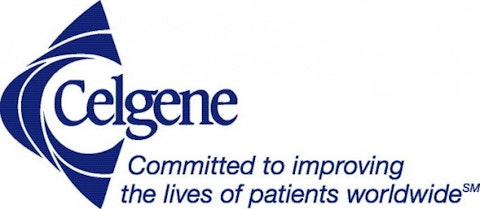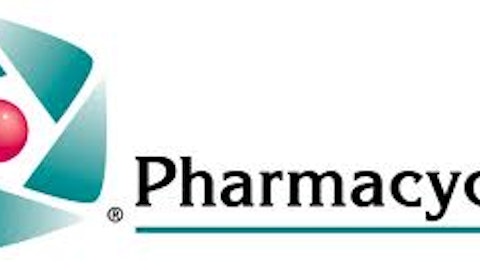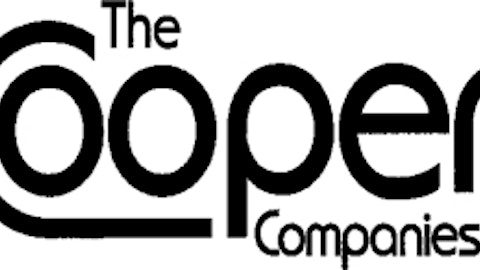They say that bad news comes in threes. I’m not sure if there’s a similar saying for good news, but for Celgene Corporation (NASDAQ:CELG) it seems to come in spades.
The big biotech announced on Thursday that updated results from its phase 3 study of Pomalyst in treating relapsed or refractory multiple myeloma had been published online in The Lancet Oncology ahead of its print edition. And those results brought more good news.

On a roll
Actually, there wasn’t really much new information with the latest update. Initial results from the phase 3 study of Pomalyst were announced last December. Celgene Corporation (NASDAQ:CELG) also provided another update in June. Everyone already knew that the drug easily met its primary endpoint of progression-free survival in multiple myeloma patients and showed significant improvement in overall survival. However, the announcement underscores the roll that Celgene has been on lately.
This late-stage clinical study formed the basis on which Celgene Corporation (NASDAQ:CELG) obtained approval for Pomalyst from the European Medicines Agency, or EMA, last month. Celgene will market the drug using the brand name Imnovid in Europe. Approval by the EMA wasn’t a surprise, since Celgene received a positive recommendation from the Committee for Medicinal Products for Human Use, or CHMP, in May.
European success was only the latest in a string of good news about Pomalyst for Celgene Corporation (NASDAQ:CELG). The U.S. Food and Drug Administration approved the drug in February. As of the end of June, Pomalyst had generated sales of nearly $95 million. That’s not a bad start for a new drug on the market.
Celgene Corporation (NASDAQ:CELG)’s good fortunes haven’t been limited to Pomalyst, though. Abraxane gained a priority review designation from the FDA in May as a potential treatment for advanced pancreatic cancer. Revlimid picked up a new approved indication in June for mantle cell lymphoma. Celgene reported positive findings from a phase 3 study of apremilast in June and more positive results from a phase 3 study of Revlimid in July.
And what about Celgene’s stock? It’s more than doubled in the past year. Yep — life’s been good for this biotech.
When will it end?
All of this brings to mind another old saying: All good things must come to an end. Could Celgene’s hot streak be in jeopardy of screeching to a halt?
There don’t appear to be any serious competitive threats looming on the horizon. Onyx Pharmaceuticals, Inc. (NASDAQ:ONXX) markets Kyprolis as a multiple myeloma treatment. Kyprolis could be viewed as a rival to Pomalyst, but I expect both drugs will be successful.
Celgene’s biggest moneymaker, Revlimid, doesn’t look to be in any imminent danger. Revlimid has emerged as the winner in the multiple myeloma market over Velcade, which is marketed by Johnson & Johnson (NYSE:JNJ) and Takeda. AbbVie Inc (NYSE:ABBV) and Bristol Myers Squibb Co. (NYSE:BMY) have a couple of phase 3 studies under way for elotuzumab. They’re also testing the experimental drug in a phase 2 study in combination with Revlimid. It’s quite possible that the two companies could ultimately gain approval for elotuzumab and still not impact Celgene’s sales too much.
You might look at Celgene’s dependence on Revlimid and see it as the company’s Achilles’ heel. The drug accounts for nearly two-thirds of total revenue. However, Abraxane, Pomalyst, and apremilast seem poised to reduce Celgene’s dependence on Revlimid in the future.
Valuation isn’t worrisome yet, either. Celgene’s trailing price-to-earnings multiple is over 40 — the highest it’s been in nearly four years. However, considering the biotech’s solid potential for earnings growth, that’s not too high in my view.
The good string of events for Celgene will surely come to an end at some point. From all appearances, though, that end will be later rather than sooner.
The article When Will the Good News End for This Biotech? originally appeared on Fool.com and is written by Keith Speights.
Fool contributor Keith Speights has no position in any stocks mentioned. The Motley Fool recommends Celgene and Johnson & Johnson. The Motley Fool owns shares of Johnson & Johnson.
Copyright © 1995 – 2013 The Motley Fool, LLC. All rights reserved. The Motley Fool has a disclosure policy.





